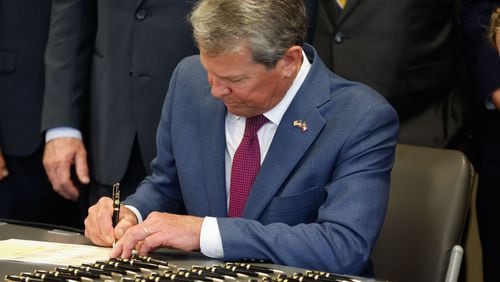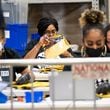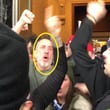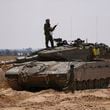NEW YORK (AP) — Columbia University students who inspired pro-Palestinian demonstrations across the country said Friday that they have reached an impasse with administrators and intend to continue their encampment until their demands are met.
The announcement after two days of exhaustive negotiations comes as Columbia’s president faces harsh criticism from faculty. The development puts more pressure on university officials to find a resolution ahead of planned graduation ceremonies next month — a problem that campuses from California to Massachusetts are facing.
Columbia officials had said that negotiations were showing progress as the school’s self-imposed early Friday deadline to reach an agreement on dismantling the encampment came and went. Nevertheless, two police buses were parked nearby and there was a noticeable presence of private security and police at entrances to the campus.
“We have our demands; they have theirs,” said Ben Chang, a spokesperson for Columbia University, adding that if the talks fail the university will have to consider other options.
Student negotiators representing the Columbia encampment said that after meeting with administrators for 11 hours Thursday and another hour Friday, the university had not met their primary demand for divestment, although they had made progress on a push for more transparent financial disclosures.
“We will not rest until Columbia divests,” said Jonathan Ben-Menachem, a fourth-year doctoral student.
Meanwhile. Columbia’s president, Minouche Shafik, faced a significant — but largely symbolic — rebuke from faculty Friday but retains the support of trustees, who have the power to hire or fire the president.
A report by the university senate’s executive committee, which represents faculty, found Shafik and her administration had “taken many actions and decisions that have harmed Columbia University.” Those included calling in police and allowing students to be arrested without consulting faculty, failing to defend the institution in the face of external pressures, misrepresenting and suspending student protest groups, and hiring private investigators.
Just past midnight, a group of some three dozen pro-Palestinian protesters handed out signs and started chanting outside of the locked Columbia University gates. They then marched away as at least 40 police officers assembled nearby.
On Friday morning, hundreds of counterprotesters gathered on the streets outside Columbia, many holding Israeli flags and chanting for the hostages being held by Hamas and other militants to be released.





